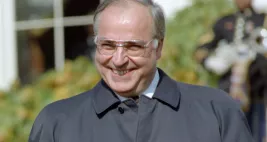December 21, 1992
The Chancellor's [Helmut Kohl's] Meeting with French President Mitterrand on the Periphery of the European Council in Edinburgh on Saturday, 12 December 1992
AL 2 Bonn, 21. Dezember 1992
V e r m e r k
Betr.: Gespräch des Herrn Bundeskanzlers mit dem französischen Staatspräsidenten Mitterrand am Rande des Europäischen Rats in Edinburgh am Samstag, dem 12. Dezember 1992[1]
Präsident Mitterrand weist darauf hin, daß es seit einigen Tagen eine neue Währungsoffensive gebe. Hiervon seien nicht nur die dänische Krone, sondern auch der französische Franc betroffen. Deutschland habe Frankreich bei der letzten Krise unterstützt, wofür er dankbar sei. Er frage sich, welches die Ursachen dieser Währungskrise seien. Nach seiner Einschätzung gebe es eine angelsächsische Offensive gegen das EWS. Ihn mache stutzig, daß der amerikanische Unterhändler bei den Gesprächen über das Eurokorps davon gesprochen habe, daß "Maastricht tot sei".
Hierüber werde er auch mit Clinton sprechen. Offenbar fürchteten die Amerikaner die wirtschaftliche Kraft Europas. Er habe die Sorge, daß das EWS zerbreche. Die Lage sei kritisch. Frankreich wolle das EWS nicht verlassen. Aber er frage sich, was man machen könne, wenn das EWS "uns" verlasse.
Der Bundeskanzler erklärt, möglicherweise könne sich eine kleine Gruppe zusammensetzen und mit dem Problem befassen. Es würde ihn aber interessieren, welchen Hinweis der Präsident dafür habe, daß es eine angelsächsische "Offensive" gebe.
Präsident Mitterrand erwidert, es lägen ihm entsprechende Hinweise vor. Im übrigen lasse er sich in diesem Punkt auch von seinem Gefühl leiten. Er sei damit einverstanden, daß eine Gruppe sich mit dem Thema beschäftige. Er wäre im übrigen nicht überrascht, wenn wir eine schwierige Woche vor uns hätten. Man solle daher sehr engen Kontakt halten.
Der Bundeskanzler erklärt, er glaube nicht, daß die Amerikaner den europäischen Integrationsprozeß wirklich hemmen wollten. Für ihn sei es sehr wichtig gewesen, daß bei dem gestrigen ER deutlich geworden ist, daß man notfalls auch zu Zehnt weitermachen werde.
Präsident Mitterrand erklärt abschließend, er frage sich, ob es nicht klug sei, die Frist für die monetäre Einheit schon früher zu setzen.
Der Bundeskanzler erklärt, auch diese Frage könne man in der AG klären.
(Dr. Hartmann)
[1] BArch, B 136/59736, 303-304.
[Editor’s note: This document was also published, in the German original, in Andreas Wirsching, Hélène Miard-Delacroix, and Gregor Schöllgen, eds., Akten zur Auswärtigen Politik der Bundesrepublik Deutschland 1992 (Berlin; Boston: De Gruyter Oldenbourg, 2023), https://doi.org/10.1515/9783110985986.]
Head of Department 2 Bonn, 21 December 1992
M e m o r a n d u m
Subject: The Chancellor's Meeting with French President Mitterrand on the Periphery of the European Council in Edinburgh on Saturday, 12 December 1992[1]
President Mitterrand points out that there had been a new currency offensive in the past few days. This did not just have an impact on the Danish Crown, but also on the French Franc. During the last crisis, Germany had supported France and he was grateful for this.
He wondered about the origins of the currency crisis. He thought that there was an Anglo-Saxon offensive against the European Monetary System. He was suspicious of the fact that the American negotiator had said that "Maastricht was dead” in the talks on the Eurocorps.
He would discuss this with Clinton. The Americans were apparently scared of Europe’s economic might.
His concern was that the EMS could fall apart. The situation was critical. France did not want to leave the EMS. But he wondered what one could do if the EMS left us.
The Chancellor says that perhaps a small group could get together to discuss this problem. He would be interested in the President’s information indicating that this was an Anglo-Saxon "offensive."
President Mitterrand replies that he had relevant hints. Moreover, his gut feeling was also relevant in this regard. He agreed to have a small group discuss this issue. Furthermore, he would not be surprised if a difficult week was ahead of us. They should remain in close contact.
The Chancellor says that he did not believe that the Americans really wanted to inhibit Europe’s integration process. It had been very important for him that yesterday’s European Council had conveyed the message that they would also continue to ten states if needed.
President Mitterrand finally says that if it was not wise to set the deadline for the introduction of the common currency early.
The Chancellor says that this question could also be discussed in the working group.
(Dr. Hartmann)
[1] BArch, B 136/59736, 303-304.
Mitterrand complains what he sees as an "Anglo-Saxonian" offensive against the European currency system arguing that the United States were beginning to fear Europe's economic strength. Kohl does not share this view and argues for caution.
Author(s):
Associated People & Organizations
Associated Topics
Document Information
Source
Original Archive
Rights
The History and Public Policy Program welcomes reuse of Digital Archive materials for research and educational purposes. Some documents may be subject to copyright, which is retained by the rights holders in accordance with US and international copyright laws. When possible, rights holders have been contacted for permission to reproduce their materials.
To enquire about this document's rights status or request permission for commercial use, please contact the History and Public Policy Program at [email protected].
